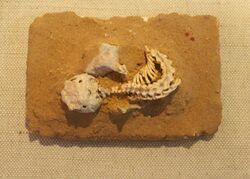Biology:Sineoamphisbaena
| Sineoamphisbaena | |
|---|---|

| |
| Holotype, Paleozoological Museum of China | |
| Scientific classification | |
| Domain: | Eukaryota |
| Kingdom: | Animalia |
| Phylum: | Chordata |
| Class: | Reptilia |
| Order: | Squamata |
| Genus: | †Sineoamphisbaena Wu et al., 1993 |
| Species | |
| |
Sineoamphisbaena is an extinct genus of squamate of uncertain phylogenetic placement. Its fossils have been found in Late Cretaceous deposits in Inner Mongolia, China.[1] It contains a single species, Sineoamphisbaenia hexatabularis.[1]
Taxonomic affiliation
Wu et al.[1] and Gao[2] proposed and argued that Sineoamphisbaenia was the oldest known amphisbaenian; this, however, was challenged by other authors, such as Kearney[3] and Conrad,[4] who instead assigned Sineoamphisbaena to the group of squamates variously known as Macrocephalosauridae, Polyglyphanodontidae or Polyglyphanodontia.
A large-scale study of fossil and living squamates published by Gauthier et al. in 2012[5] did not find evidence for a particularly close relationship between amphisbaenians and Sineoamphisbaena; in their primary analysis Sineoamphisbaena was found to be the sister taxon of the clade containing snakes, amphisbaenians, the family Dibamidae and the American legless lizard. The primary analysis of Gauthier et al.[5] did not support a close relationship between Sineoamphisbaena and polyglyphanodontians either; however, the authors noted that when all snake-like squamates and mosasaurs were removed from the analysis, and burrowing squamates were then added individually to it, Sineoamphisbaena grouped with polyglyphanodontians. Gauthier et al.[5] considered it possible that Sineoamphisbaena was a burrowing polyglyphanodontian.
Sources
- World Encyclopedia of Dinosaurs & Prehistoric Creatures: The Ultimate Visual Reference To 1000 Dinosaurs And Prehistoric Creatures Of Land, Air And Sea ... And Cretaceous Eras (World Encyclopedia) by Dougal Dixon
References
- ↑ 1.0 1.1 1.2 Wu, Xiao-chun; Brinkman, Donald B.; Russell, Anthony P.; Dong, Zhi-ming; Currie, Philip J.; Hou, Lian-hai; Cui, Guf-hai (November 1993). "Oldest known amphisbaenian from the Upper Cretaceous of Chinese Inner Mongolia" (in en). Nature 366 (6450): 57–59. doi:10.1038/366057a0. ISSN 1476-4687. https://www.nature.com/articles/366057a0.
- ↑ Gao, Keqin (1997-06-01). "Sineoamphisbaena phylogenetic relationships discussed: Reply" (in en). Canadian Journal of Earth Sciences 34 (6): 886–889. doi:10.1139/e17-073. ISSN 0008-4077. http://www.nrcresearchpress.com/doi/10.1139/e17-073.
- ↑ Kearney, Maureen (2003-06-17). [0394:TPPOSH2.0.CO;2 "The phylogenetic position of Sineoamphisbaena hexatabularis reexamined"]. Journal of Vertebrate Paleontology 23 (2): 394–403. doi:10.1671/0272-4634(2003)023[0394:TPPOSH2.0.CO;2]. ISSN 0272-4634. https://doi.org/10.1671/0272-4634(2003)023[0394:TPPOSH]2.0.CO;2.
- ↑ Conrad, Jack L. (June 2008). "Phylogeny And Systematics Of Squamata (Reptilia) Based On Morphology". Bulletin of the American Museum of Natural History 2008 (310): 1–182. doi:10.1206/310.1. ISSN 0003-0090. https://bioone.org/journals/bulletin-of-the-american-museum-of-natural-history/volume-2008/issue-310/310.1/Phylogeny-And-Systematics-Of-Squamata-Reptilia-Based-On-Morphology/10.1206/310.1.full.
- ↑ 5.0 5.1 5.2 Gauthier, Jacques A.; Kearney, Maureen; Maisano, Jessica Anderson; Rieppel, Olivier; Behlke, Adam D. B. (April 2012). "Assembling the Squamate Tree of Life: Perspectives from the Phenotype and the Fossil Record". Bulletin of the Peabody Museum of Natural History 53 (1): 3–308. doi:10.3374/014.053.0101. ISSN 0079-032X. https://bioone.org/journals/bulletin-of-the-peabody-museum-of-natural-history/volume-53/issue-1/014.053.0101/Assembling-the-Squamate-Tree-of-Life--Perspectives-from-the/10.3374/014.053.0101.full.
Wikidata ☰ Q7522422 entry
 |

